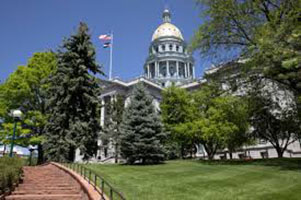It’s been off and on for the Colorado General Assembly over the past 15 months, as the COVID-19 pandemic has meant opening and closing in-person legislative sessions and committee hearings, leading Colorado lawmakers to work mostly remotely, handing legislative work, and campaigning during a difficult time.
On Tuesday, both Senate and House Democratic leaders gave the first, tentative indications on just when the 2021 legislative session could come to an end. The Colorado House appears poised to make May 28 their last day in session, or perhaps not.
News media that regularly cover the Capitol report there is a contingent led by Speaker of the House Alec Garnett (D-Denver), and Senate Majority Leader Steve Fenberg (D-Boulder). Both have brought up the possibility of taking a Memorial Day break.
But what kind of break is important: There is a big difference between what’s known as “adjournment”, or “recess.”
Adjournment normally means the end of the current session. Were the session to end the Friday before Memorial Day, that would be May 28.
But if our lawmakers were to come back sometime after Memorial Day to figure out how to spend Colorado’s share — $3.9 billion — of federal stimulus money from the American Rescue Plan, that is different. Then adjournment would mean a special session, either to be called by Gov. Jared Polis or with a two-thirds vote of each chamber.
Senate President Leroy Garcia, D-Pueblo, has gone on record saying he thinks getting a two-thirds vote would be achievable and necessary, given how important that stimulus money is to the state. So if the General Assembly simply recesses around May 28 for the maximum allowable 120 days of the session, they could come back anytime between May 28 and June 12, to address the assignment of the stimulus funds.
The Colorado Supreme Court ruled in 2020 that due to the situation created by the COVID-19 pandemic, the state statute of a maximum of 120 days of the legislative session does not have to be consecutive days.
The timing of the release of the federal stimulus is a major factor in the decision. Colorado received notice on April 15 from the U.S. Treasury that guidelines are still being developed and would be released “in the coming weeks.”








Recent Comments